Integrated Temperate Fruit Crops Promotion Project held a series of Smallholder Horticulture Empowerment and Promotion (SHEP) workshops in Bhutan (2022-09-19)
Integrated Temperate Fruit Crops Promotion Project, which started from March 2022, held three days SHEP workshops from July 5th to 7th for its Counterpart officers in National Centre for Organic Agriculture (NCOA) Yusipang.
This project aims to promote horticulture commercialization through strengthening production and supply of quality temperate fruit seedlings and orchard management, and it is planned to implement SHEP workshops for National Seed Centre (NSC) Paro, NCOA Yusipang, Agriculture Research and Development Centre (ARDC) Bajo, Dzongkhag Agriculture Officers (DAOs), and Extension Officers, as a part of project's activities.
t to agricultural development research center, provincial agricultural office staff and extension workers. The facilitators were Ms. Ugyen and Ms. Tashi, who are officers in charge of Fruit Crops in NCOA Yusipang and participated in the 2021 Bhutan Country Focused Training Program "Regional Agribusiness Promotion by Introduction of Market-Oriented Agriculture and Value Chain Model."
On the first day, participants learned about what is SHEP approach and the lessons learnt through the implementation of pilot activities. Then, participants learned how to conduct a participatory baseline survey and a market survey, and discussed a baseline survey questionnaire suitable for the situation in Bhutan on the second day. Calculating production costs seems to have become a good brain exercise for them. Finally, they visited to a nearby market to practice market research and analyzed the results on the third day. They recognized the importance of gender awareness in the practice of "Agriculture as a Business" at the end of the workshops. Making Daily Activity Calendar as exercise for gender analysis, which was conducted separately for men and women, was the most exciting, and they learned that male farmers in Bhutan are engaged in farm work from early morning to late at night during the busy farming season.
Ms. Ugyen and Ms. Tash introduced their process to implement action plans as an easily understandable example, which had made them deepen their understanding of the SHEP approach through the implementation of their own action plans. The participants realized that "Many farmers in this country have marketing issues. The SHEP approach can help such farmers." It is hoped that SHEP approach in Bhutan will be implemented steadily even if the scale is small.
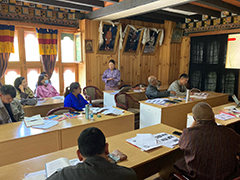
Ms Tashi presented progress of SHEP pilot activities and lessons learnt.
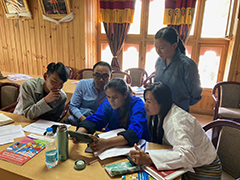
Mr. Ugyen watches over the counterparts who are seriously working on the SHEP game.
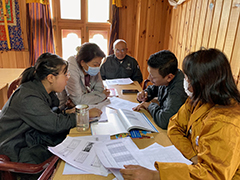
Participants discussed a baseline survey questionnaire
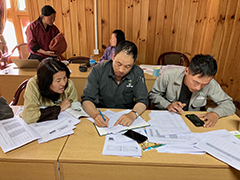
Calculating production costs
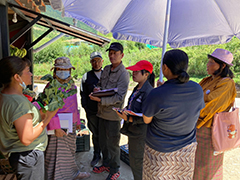
practice market research at nearby market (Broccoli)
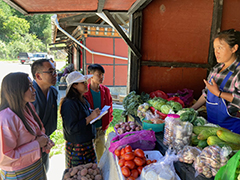
practice market research at nearby market (Potato)
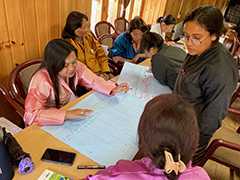
Making Daily Activity Calendar as exercise for gender analysis (Female Group)
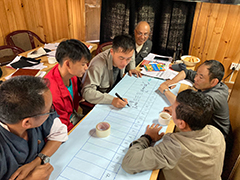
Making Daily Activity Calendar as exercise for gender analysis (Male Group)
